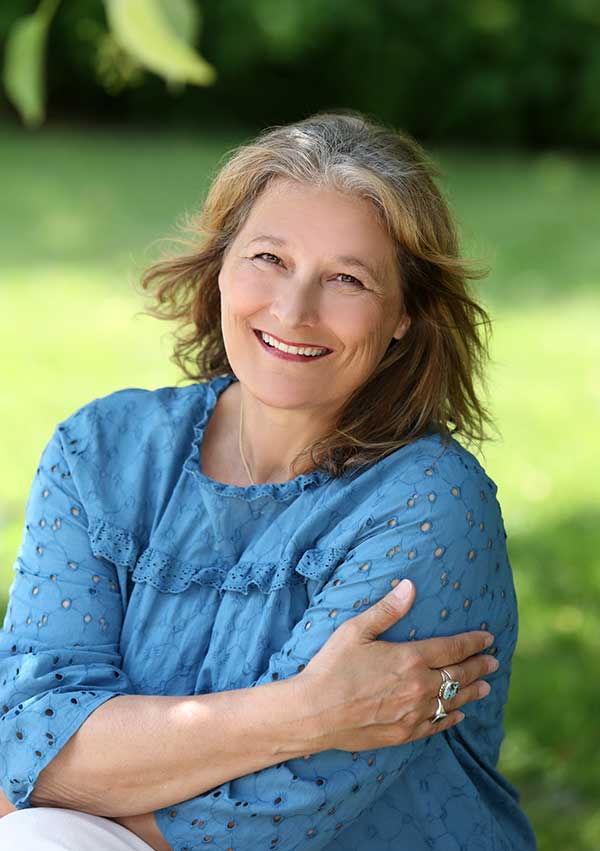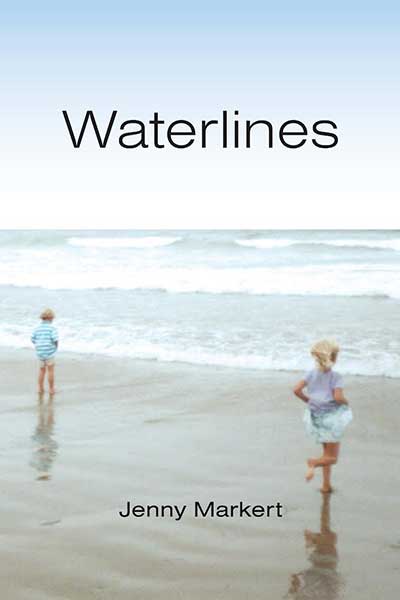A novel was brewing in Jenny Markert ’87 more than 35 years ago when she was at the College of Saint Benedict – even though she didn’t know it.
As a teen growing up in St. Paul, and after she enrolled at Saint Ben’s, she spent her summers in the lakes region north of Brainerd. Her parents bought 75 feet of lakeshore and a small cabin for $27,000 in 1978, succeeding only the original owners. With four sisters among her seven siblings, and a wealth of cousins, aunts and uncles who also vacationed near Nisswa and Pequot Lakes, she developed a strong attraction for biking rural roads, hiking the forests, canoeing and swimming. Before her senior year at CSB, she spent a couple summers waiting tables at a popular lakeside restaurant, earning tips to help pay her tuition, and seeing lake life from the perspective of the locals as opposed to the tourists.
After graduating with an English degree and a post-secondary education license, Markert moved to Los Angeles, leaving her beloved lake country behind. By the time she returned, land values had risen so much that her parents couldn’t afford the property taxes and sold their haven in the mid-1990s for more than six times what they paid. The buyers razed the seasonal cabin, built a large home and today the property is likely worth much more than $1 million.
“It’s so expensive now, but the water quality has gone down significantly,” Markert said. “You have Zebra mussels and milfoil and things like that are destroying the quality of the lakes. I still have relatives who have cabins in the area, and I go up there frequently now. There were about 15 years where I was away and, once I returned, I started thinking to myself ‘I’ve got to write a book about this.’”
Late this summer, she achieved her goal when Waterlines was released by Elder Eye Press of Minnetonka. Available on Amazon, the book is a combination coming-of-age story, love story, murder mystery, a tale of survival and elegy for ecology and the American Dream. It traces tales indigenous to fictional Quartz Lake from when the Dakota and Ojibwe tribes fought over it in the 1860s through the touristy transformation of the 1980s as told through the eyes of the main character, a young woman named Eleanor. She returns in the early 2000s, by then a corporate editor, yoga teacher and mother, grappling with how much the lake has changed, and is then forced to uncover secrets of the past to reconcile the present and future.
Influenced by Thoreau, Dillard and Steinbeck
Markert, who has published more than 30 children’s books, has been fascinated by writers all her life and began honing her skills to become one even before she graduated in 1983 from Derham Hall, an all-girls Catholic high school in St. Paul. A few years later, it merged with an all-boys school to become Cretin-Derham Hall. More than a decade ago, Markert returned there to teach English.
She also was awarded two different National Endowment for the Humanities awards during the course of her career to study transcendentalism as both a teacher and professional writer and editor.
“I have a lot of education in transcendental writers like Ralph Waldo Emerson and the more recent Annie Dillard, and I really wanted to create something that felt like what I was talking about,” she said. “I wanted to give the novel a feel like water.”
The story goes back and forth in time, with a rhythm. On some pages, the text is staggered to mimic waves lapping at the shore before retreating to do it over again. And, in homage to John Steinbeck’s The Grapes of Wrath, Markert structured Waterlines with intercalary chapters – essays interspersed in the story that do not involve the main characters or advance the plot.
“There’s poetry and a change in perspective,” she said. “It’s complicated. It’s not a beach read. It has a lot of depth to it. It’s not just entertainment. Some people might be turned off by that. I wanted the book to seem like you’re at the shore, and you go into the water a little, and then you go into really deep water. I fill in some cultural history. There’s a chapter about traffic and driving up north. On a Friday night, it’s stop and go traffic and I make the analogy that it’s kind of like a river and sometimes we pollute the river with too much traffic. It’s a statement about our society today, the environment and climate change.
“Most tourists don’t have an investment in the long-term health of the lakes,” she added. “They drive big speedboats, and they want to go waterskiing and party on the peninsula. They leave their trash there. I have hope that it will rebound. And we have a lot of people trying to educate about water quality, but right now the lakes look startlingly different to me than they did when I was younger.”
Saint Ben’s helped shape author, her story
In Waterlines, Markert can instantly slip back to when she was at Saint Ben’s, often daydreaming of the cabin about 70 miles north. It was then that S. Mara Faulkner ’62, OSB, taught Markert in a creative writing class and convinced her she could someday write a novel. And, perhaps fittingly, Markert met her husband at the Saint John’s University pool.
“I was attracted to Saint Ben’s for the very reason that it was an all-women’s school,” said Markert, who has two adult children. “Our classes were integrated and there were all kinds of social opportunities, but when you live in the dorms, it’s only girls. I have a lot of friends to this day from Saint Ben’s that I get together with. We do it regularly, about 12-15 of us. The students I have today who go to co-ed colleges don’t seem to have the same kind of friends that I do – really deep, good-quality relationships.
“I went to Reunion last spring, and I was astounded at how amazing and successful these women are,” Markert added. “I was sitting at a table with other 1987 graduates, and we had immigration lawyers and a judge. There were writers and teachers, too. It just made you feel good.”
Markert qualifies as both writer and teacher. And, with designs to write and publish more, she may continue to blur the line for which title fits best.

Jenny Markert ’87 has published her first novel, Waterlines, on the heels of more than 30 children’s books on wildlife, national park adventures and nature. She teaches senior English at Cretin-Derham Hall High School in St. Paul.

Waterlines is a novel centered around fictional Quartz Lake in Minnesota. Three storylines flow back and forth within the book, including the Dakota and Ojibwe tribes of the 1860s, the touristy glory days of the 1980s, and a return by the main character to the lake in the early 2000s after a lengthy absence. It is a coming-of-age story, a love story, a murder mystery, a tale of survival, and an elegy for ecology and the American dream.
